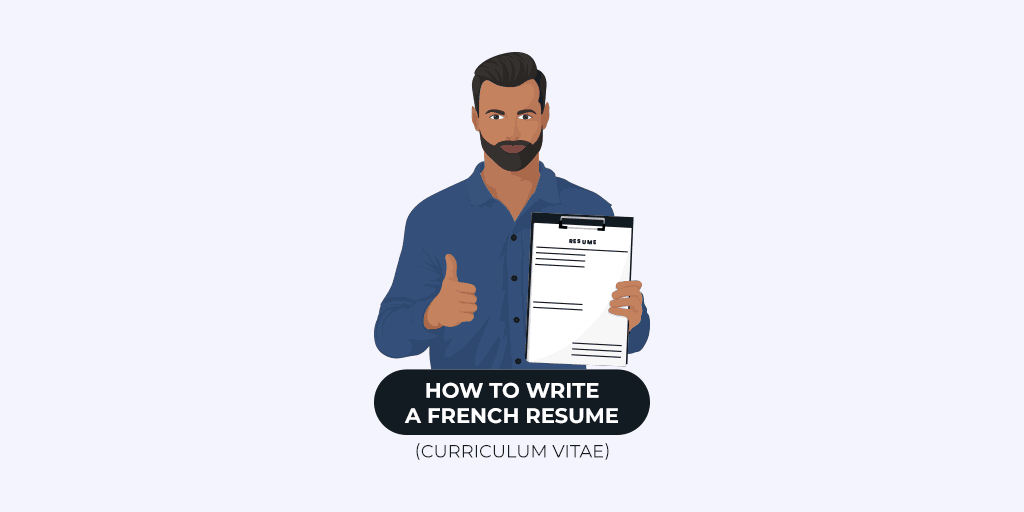So, you want to get a job or internship in a French-speaking country. How exciting! However, before you find yourself in front of the recruiters, you will need to send an eye-catching resume to convince them you are the right fit for the job. Unfortunately, it isn't as simple as popping your trusted resume into Google Translate.
The French resume – also known as Curriculum Vitae or CV – may be different than the one you use in your home country. No worries, though! Here is how to write an impressive French CV that will show off your skills and help you land your dream job.
See also: How to Ace a Job Interview in French

1. What you should know about the French CV
Your resume will be the first impression your French recruiter will have of you. In many cases, they will go through many applicants before reaching yours. Make sure your CV is clear, short (one A4 page is best or two at most) and to the point.
It is never wise to oversell yourself. Not only is information easy to verify nowadays, but French resumes are very factual. If you want to include a description, stick to the infinitive form rather than "I…." Your CV isn't the right place to highlight your personal achievements (like those "amazing people skills"): wait until the interview to shine.
Here are some other tips in making your French CV:
2. Informations personelles (Personal information)
Surprise! Your French employers need a lot more personal information than you would usually provide in your home country. It includes your age, your marital status, and yes… a picture.
It is a common requirement in many European countries. Resist grabbing a snap from your latest vacation though. The picture to include in your French Curriculum Vitae should be a passport-sized professional headshot.
Don’t forget to include your contact information. If you are currently living abroad, remember to include your country code with your phone number(s). Professional profiles (such as LinkedIn) or websites are also acceptable.
Here is what to include in this section:
| Prénom | First name |
| Nom | Last name |
Pro tip: Capitalize your last name!
| Adresse | address |
| Numéro de téléphone | phone number |
| Bureau | work number |
| Domicile | home number |
| Portable | cellphone number |
| Adresse e-mail | email address |
| Nationalité | nationality |
| Age | age |
| Situation de famille (or Etat Civil) | marital status |
| Marié(e) | married |
| Veuf (veuve) | widower (widow) |
| Divorcé(e) | divorced |
| Célibataire | single |
3. Projet Professionnel (Introduction)
This short section acts as the “title” to your CV. In a few words, what is your goal in sending your resume?
If you are applying for a specific job, it should be straightforward. Succinctly let the reader know what you will bring to the company and why you are the best applicant for this post.
It can be a bit vaguer and relate to your long-term career goals if you are not tailoring your application for a particular job.
4. Formation (Educational experience)
Include all your relevant diplomas, certifications, and education in this section, especially if you graduated recently and do not have a long professional experience. Include the name of the school, its location, the dates during which you attended, the diploma you earned, and your grade.
Since every country has its own academic and gradation system, don’t hesitate to include the French equivalent so the recruiter can appreciate your hard work!
| High School Diploma | Baccalauréat (BAC) |
| Associate’s Degree | DEUG – General or DUT, BTS – Technical (BAC + 2) |
| Bachelor’s Degree (3 years) | License (BAC + 3) |
| Bachelor’s Degree (4 years) | Maîtrise (BAC + 4) |
| Masters Degree or MBA | Masters or DEA, DESS (BAC + 5/6) |
| Doctorate PhD, LLD or JD | Doctorat (BAC + 8) |
You can also include any awards as well as any professional training programs or courses you may have undertaken. Don't hesitate if they are relevant to the fields in which you are applying.
5. Expérience Professionelle (Work Experience)
You can choose to include your entire professional history if you haven't been working long in your field. If you are an experienced professional, stick to your previous that is relevant to the job you are applying for. Chronological order – starting with your most recent position – is the way to go.
Include the company's name and location, the date during which you worked in this position, your title, and a brief description of your responsibilities. If you haven't worked yet, you can also include past volunteer work, internship, or military service.
6. Compétences (Skills)
This is the perfect section to include the skills that could be relevant to the jobs you are applying for. There are usually two main categories.
If it is relevant to your job, you can also include if you have your driving license.
| Compétences techniques | technological aptitudes |
| Systèmes d’exploitation | operating systems |
| Langages de Programmation | programming languages |
| Logiciels | software |
Always include your proficiency level and be honest about it. It is often very easy to verify! Include your results to any.
If you are familiar with it, you can use the Common Reference Levels issued by the Common European Framework of Reference for Languages (CEFR). Otherwise, a simple description is enough.
| (Basic) knowledge | Notions |
| Conversant | Maîtrise convenable, Bonnes connaissances |
| Proficient | Lu, écrit, parlé |
| Fluent | Courant |
| Bilingual | Bilingue |
| Native language | Langue maternelle |
7. Centres d’intérêt (Hobbies)
If you want to stand out from the crowd, here is your chance to shine. If your hobbies include pastimes that may help you in your job search, go for it.
However, be aware that the interviewer may bring the subject up during the interview, so don't fake your interest in the matter. Keep this section short and sweet: one or two lines are enough.
Hope this article helped you make your French CV!
Which section do you think is the hardest to fill up in a French resume? Share with us in the comments!
SIGN UP BELOW...
AND GET INSTANT ACCESS TO THE FREEBIES

